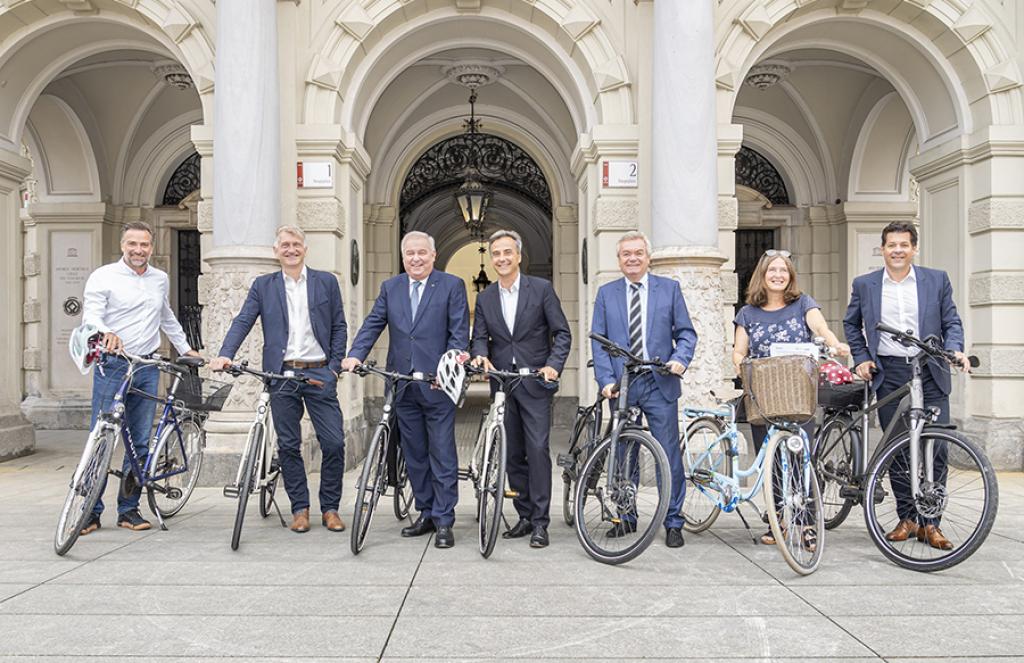Thessaloniki gets ready for its metro launch in November
The underground rapid transit lines have been under construction for almost two decades due to various project delays
 TheMayor.EU logo
TheMayor.EU logo 
Graz city top officials including Mayor Elke Kahr after signing the ‘Radoffensive 2030 Master Plan’, Source: City of Graz
Dethroning the car as the king of the road
Today, authorities in Graz, Austria, announced more concrete measures that will aim to impellent regarding the city’s ongoing cycling initiative called ‘Radoffensive 2030 Master Plan’. The measures include a rearrangement of the traffic hierarchy with the ultimate goal to double the number of cyclists in the next three years.
One of the major proposals discussed today included turning all one-way streets in the city into cycling streets, thereby restricting cars even further in the urban space.
The move echoes a recent initiative from Luxembourg that introduced cycling right of way in certain areas in the capital.
Currently, when it comes to road laws and the way transport infrastructure in a city is built, the car is king. Well, according to Graz officials, that will not be the case for long in Austria’s second-biggest city.
Pedestrians will have priority over cyclists and public transport, which in turn will have priority over cars – the pyramid of traffic will be turned on its head. The main goal behind the move, according to a statement by the ORF, the Austrian public broadcasting service, would be to discourage the usage of cars for short trips in the city.
Through the implementation of planned inconvenience, citizens should replace motor vehicles with bikes as their primary mode of transport in the city. Thus, the city is expecting bike traffic to double by 2025. Currently, just 19% of citizens use cycling as their main mode of transport.
Before the massive adoption of the car in the first half of the 20th century, city streets used to belong to pedestrians, horses, cartridges and early forms of public transport like the tram. Then, however, as more and more people adopted the personal car and road accidents began to mount, local authorities started separating motorised traffic from everyone else.
The result – pedestrians were pushed to the sidewalks, while streets became oversaturated with cars, noise and air pollution. This, in turn, led to the creation of traffic infrastructure that discouraged modes of transportation other than the car. Graz’s current policy shift would rearrange that order, providing incentives for other modes of transport.
According to Judith Schwentner, the Deputy Mayor of Graz who is also responsible for traffic policy, the road network in Graz is reaching its limits as the traffic reports claim. At the same time, the city’s population in its metro area is projected to grow by an impressive 20% by 2030.
Rather than expanding space for cars, authorities have opted for promoting public transport, pedestrian options and cycling infrastructure. According to the city’s cycling master plan, people of all ages should be encouraged to switch to bicycles. At the same time, public transport, sidewalks and, above all, cycle paths must be made more attractive in order to prevent traffic gridlock.
The new network should cover the entire city and run without interruption to commuter towns. They also call for all one-way streets in the city to become two-way bike streets instead. This would dissolve the bigger crowds of pedestrians and cyclists, currently bottlenecking the city’s infrastructure.
The exact plans for the implementation of the strategy and funding will be presented before the local council’s summer break, however, some things are already outlined in the ‘Radoffensive 2030 Master Plan’.
They include an investment of 100 million euros over the next eight years and 100 kilometres of new cycling infrastructure.

The underground rapid transit lines have been under construction for almost two decades due to various project delays

Now you can get your wine in Talence by paying directly in Bitcoin

That’s because the state has to spend money on updating the railway infrastructure rather than subsidizing the cost of the popular pass

Rethinking renewable energy sources for the urban landscape

The examples, compiled by Beyond Fossil Fuels, can inform and inspire communities and entrepreneurs that still feel trepidation at the prospect of energy transition

Now you can get your wine in Talence by paying directly in Bitcoin

The 10th European Conference on Sustainable Cities and Towns (ESCT) sets the stage for stronger cooperation between the EU, national and local level to fast track Europe's transition to climate neutrality.

At least, that’s the promise made by the mayor of Paris, Anne Hidalgo

The underground rapid transit lines have been under construction for almost two decades due to various project delays

At least, that’s the promise made by the mayor of Paris, Anne Hidalgo

Hostal de Pinós is located in the geographical centre of the autonomous region

Despite its church-y name, the district has long been known as the hangout spot for the artsy crowds

Urban dwellers across the EU are having a say in making their surroundings friendlier to people and the environment.

Forests in the EU can help green the European construction industry and bolster a continent-wide push for architectural improvements.

Apply by 10 November and do your part for the transformation of European public spaces

An interview with the Mayor of a Polish city that seeks to reinvent itself

An interview with the newly elected ICLEI President and Mayor of Malmö

A conversation with the Mayor of Lisbon about the spirit and dimensions of innovation present in the Portuguese capital














